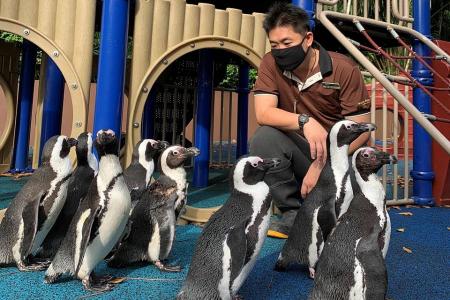Singapore wildlife parks monitor animals for signs of Covid-19
S'pore's 4 wildlife parks observing animals for signs of coronavirus after tiger in US zoo tests positive
Wildlife parks, including the Singapore Zoo, are monitoring their captive animals for coronavirus infections after a tiger at New York City's Bronx Zoo tested positive for the virus last month.
Animal caregivers at Singapore's four wildlife parks, which include the Jurong Bird Park, Night Safari and River Safari, are closely observing the animals for signs of irregular behaviour and illness, said Dr Cheng Wen-Haur, deputy chief executive of Wildlife Reserves Singapore (WRS).
"During this time, clinical signs such as dry cough, lack of appetite and other respiratory concerns that may be indicative of Covid-19 would be swiftly reported to trigger further examinations by the veterinary team," he added.
WRS manages Singapore's wildlife parks.
About 120 staff, including those from the animal care and veterinary teams, are rostered daily to look after some 15,000 creatures across the four parks.
At the Bronx Zoo, officials later found several other big cats with symptoms, and reports emerged of infections in pets in Hong Kong, Belgium and parts of the US, as well as in minks at two farms in the Netherlands.
Dr Cheng, who is also the chief life sciences officer of WRS, said the risk of humans contracting the virus from animals is very low.
NO EVIDENCE
The World Health Organisation has also maintained that although experiments show that cats and ferrets are able to transmit the virus to other animals of the same species, there is no evidence that such animals can transmit the virus to humans and play a role in its spread.
The World Organisation for Animal Health has also said there is no evidence that pets play a significant role in spreading Covid-19.
The international organisation's view has been cited locally by the Animal and Veterinary Service, which comes under the National Parks Board.
Meanwhile, staff at Singapore's wildlife parks have adopted additional protocols to prevent the cross-transmission of diseases between them and animals under their care.
Staff are also minimising or avoiding direct contact with the animals whenever possible, especially primates and carnivores, which are at a higher risk of being infected.
"Great apes are of specific concern as they typically succumb to the same diseases as humans. To a certain extent, this is true for other primates as well," Dr Cheng said.
He added that the carnivores have also proven to be susceptible.
Get The New Paper on your phone with the free TNP app. Download from the Apple App Store or Google Play Store now



